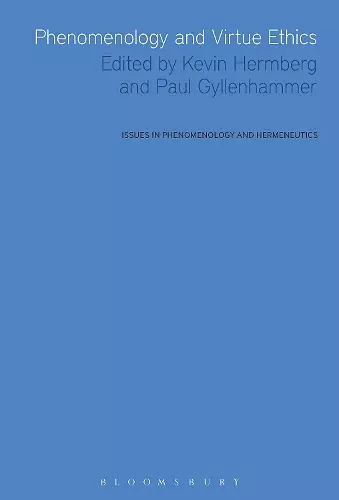Phenomenology and Virtue Ethics
Kevin Hermberg editor Dr Paul Gyllenhammer editor
Format:Hardback
Publisher:Bloomsbury Publishing PLC
Published:10th Oct '13
Currently unavailable, and unfortunately no date known when it will be back

This volume explores how phenomenology contributes to virtue ethics and clarifies some of the issues that are central to virtue ethics.
The correlation between person and environment has long been a central focus of phenomenological analysis. While phenomenology is usually understood as a descriptive discipline showing how essential features of the human encounter with things and people in the world are articulated, phenomenology is also based on ethical concerns. Husserl himself, the founder of the movement, gave several lecture courses on ethics. This volume focuses on one trend in ethics—virtue ethics—and its connection to phenomenology. The essays explore how phenomenology contributes to this field of ethics and clarifies some of its central issues, such as flourishing and good character traits. The volume initiates a conversation with virtue ethicists that is underrepresented in the current literature.
Phenomenology and Virtue Ethics offers contributions from prominent phenomenologists who explore the following issues: how phenomenology is connected to the ancient Greek or Christian virtue tradition, how phenomenology and its foundational thinkers are oriented toward virtue ethics, and how phenomenology is itself a virtue discipline. The focus on phenomenology and virtue ethics in a single volume is the first of its kind.
Hermberg and Gyllenhammer have put together a richly informed and creative collection of essays that offers compelling reasons for thinking about virtue ethics and phenomenology together. Focusing on the tradition as well as contemporary debates, the volume is an invaluable resource for those working in both fields and for anyone who questions what it is to live the good life. * Janet Donohoe, Professor of Philosophy, University of West Georgia, USA *
Much as Edith Stein earlier in the 20th century worked to bring together Husserlian phenomenology and Thomism, the authors in this new volume definitively and carefully argue that phenomenology and virtue ethics have a great deal to say to each other. The quality of the articles is first-rate, and editors Gyllenhammer and Hermberg are to be commended on their excellent collection, which embraces both eminent, established voices in phenomenology as well as newer, rising stars. Clearly, this book will be of great use to faculty and to students in both undergraduate and graduate courses – primarily those in the history of philosophy, ancient philosophy, ethics, and phenomenology. However, the volume's main contribution lies not only in its essential re-visioning of the history of philosophy but also (and perhaps more importantly) in its creation of a meaningful, open-ended dialogue between pairs of Aristotelian and phenomenological concepts – such as friendship and horizon; flourishing and the lived-body; and habit and creativity. * Peter R. Costello, Professor of Philosophy, Providence College, USA *
Though the pairing of phenomenology and virtue ethics might initially seem forced or unconstructive, this collection of essays opens a dialogue between the two traditions that is both insightful and timely in showing various ways in which the two may be thought to converge. The book is structured in three parts that progress from dealing with specific areas of commonality between phenomenology and virtue ethics, to phenomenological accounts of virtue-exposing similarity and divergence among contemporary thinkers, to an attempt to show the virtue in the application of phenomenology. Contributors are recognizable in their respective fields, offering essays that, though accessible, are more appropriate to graduate students and professional academics than general or undergraduate readers. Given the breadth and depth of the specific philosophic traditions under discussion, a moderate amount of background knowledge in philosophy is assumed. For those who have it and who are interested in exploring various connections between these important and influential topics, this book is an excellent resource * CHOICE *
ISBN: 9781780937021
Dimensions: unknown
Weight: 535g
256 pages